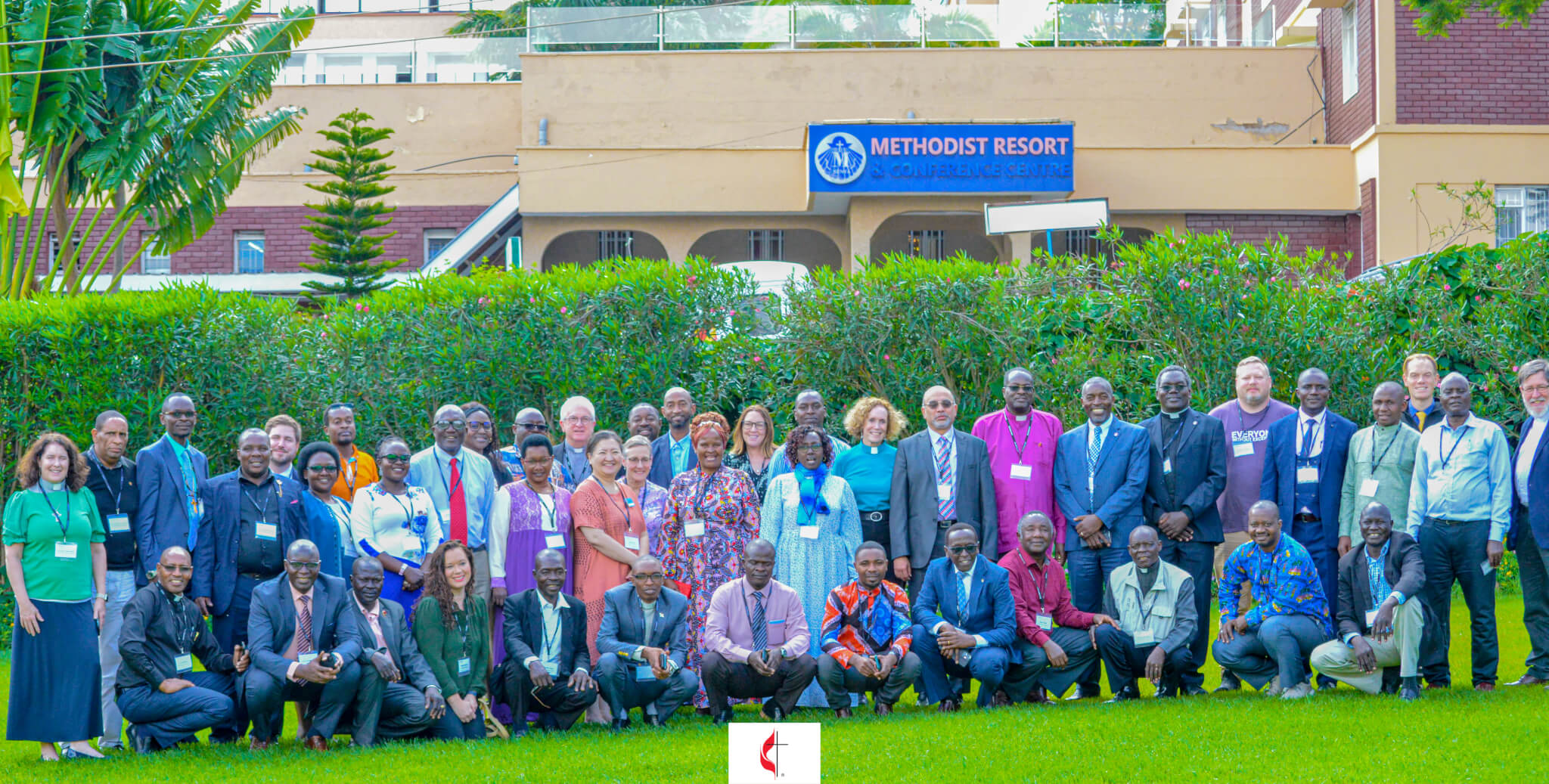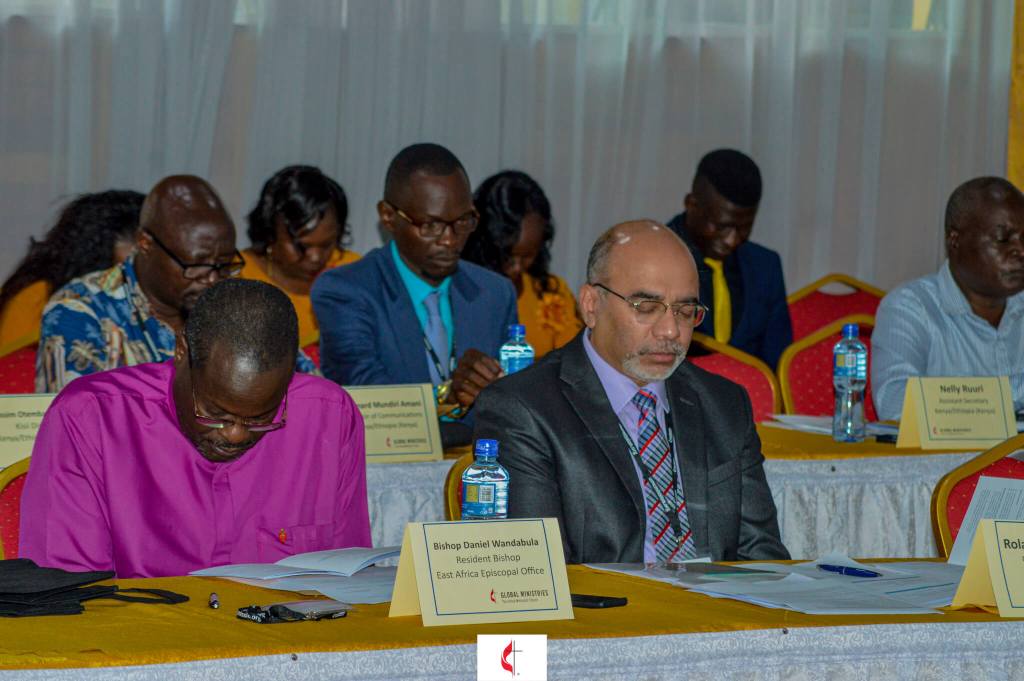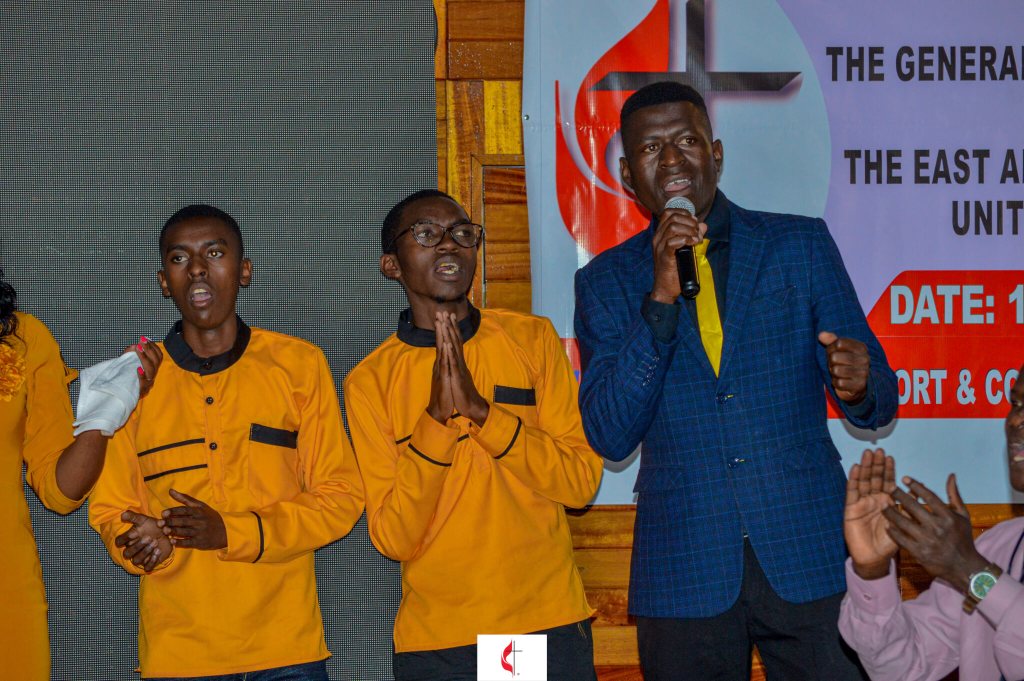
NAIROBI – “I feel as if I am in a dream…I can’t believe this meeting is happening,” said Bishop Daniel Wandabula, episcopal leader of the East Africa Episcopal Area, as he welcomed guests attending the East Africa Mission Consultation, Jan. 16-17, in Nairobi, Kenya. The mission consultation, led by General Board of Global Ministries’ General Secretary Roland Fernandes, was the first formal meeting held between Global Ministries and the East Africa Episcopal Area since they announced in May 2023 that they had reestablished formal relations, after more than a decade-long freeze on church and mission funds because of past auditing issues.
In his opening remarks, Bishop Wandabula expressed gratitude to God for allowing 2024 to begin with such an historic event. He praised the courage, commitment and efforts of all who had sought to address the mission opportunities and challenges of the episcopal area and noted the significant efforts by Global Ministries to review past audits and negotiate a path forward that would allow funding for mission work to restart. The Bishop offered appreciation to Roland Fernandes for his dedicated leadership in seeking to reestablish the relationship and in planning and holding the consultation. Acknowledging the deep pain caused by the long-severed relationship, as well as isolation from the ministry of the broader United Methodist Church during that time, Bishop Wandabula reinforced his commitment to transparency and accountability moving forward.

Fernandes also spoke about the audit issues that led to the long-fractured relationship between the East Africa Episcopal Area and Global Ministries, while expressing his hope that the consultation would be forward-looking. “We are here because we want to listen to you and continue to learn about what God is doing in your midst,” Fernandes said. “We have often used the words ‘mutuality in mission’ and I hope this will be a space where we can live it.”
Fernandes acknowledged both the significance and the complexity of this time for East Africa, the African continent, The United Methodist Church and the world. He urged consultation participants to trust that “God has called us to God’s mission in such a time as this, and with God’s help, our actions can bring new hope for mission in the region.”
Consultation participants included representatives from the four annual conferences that comprise the East Africa Episcopal Area, Uganda-South Sudan, Kenya-Ethiopia, Burundi and Rwanda; the general secretary, staff and board members from Global Ministries; and general secretaries and staff from the General Board of Higher Education and Ministry (GBHEM) and United Methodist Communications (UMCOM), two agencies in close partnership with Global Ministries. The Rev. Dr. Peter Mageto, vice chancellor of Africa University, served as a resource person for the event.
In his sermon, “Does your soul look back?,” Mageto referenced the story in Genesis of Lot and his wife as they fled the city of Sodom. He urged consultation participants to look ahead, charging them to recast the future for their children and “to be witnesses of the transformation that is taking place in the lives of men and women because of faith.”
On the first day of the meeting, representatives from each of the four conferences of the episcopal area presented their strategic and program visions for their conferences, sharing pressing needs and challenges. All delegations talked about the impact of the 12-year “embargo.” Subsequently, staff from the various programs of Global Ministries shared overviews of their programs as did staff from GBHEM and UMCOM. Following the overviews, conference teams met individually with staff leaders of each Global Ministries program and each general secretary in attendance.

Delegates from each conference shared their feedback from the individual conversations in the final session of the consultation. Training, capacity development and infrastructure, as well as missionary placements and disaster assistance, were expressed as urgent needs by conference leadership. Agriculture and global health support were also lifted up, among other programs, as vital to the overall well-being of the people of each conference. Above all, the delegates expressed great hope for the future of mission in the region. There was also feedback from the delegates about the importance of accountability and transparency to prevent a recurrence of what had happened.
In his closing remarks, Fernandes expressed his concern for the impact of the long freeze on mission support for the people of the East Africa Episcopal Area. He pledged that Global Ministries would work closely with each conference after they provide their respective strategic plans, which will be used to determine how Global Ministries might partner with each conference and how conference needs relate to Global Ministries’ strategic priorities and available resources. He highlighted the bishop’s and his shared focus on identifying a missionary to serve as treasurer for the episcopal area as soon as possible so that funding can be released for mission. A treasurer will also be able to implement processes, financial training and best practices to aid the conferences. Fernandes expressed gratitude for the candid conversations that will guide future mission partnerships between Global Ministries and the East Africa Episcopal Area. Bishop Wandabula expressed his deep thanks to Global Ministries for enabling and leading this event and his enthusiasm for the results of the consultation.
Missionary training and commissioning events were held a few days prior to the East Africa Mission Consultation. Thirty-nine young adult Global Mission Fellows were commissioned by Bishop Wandabula at Trinity United Methodist Church in Naivasha, Kenya.
The gathering in Kenya marked the fourth mission consultation organized by Global Ministries within the last year. Other consultations were held in 2023 in Maputo, Mozambique; Seoul, Korea; and Atlanta, Georgia.
Susan Clark is the chief communications officer for Global Ministries.

